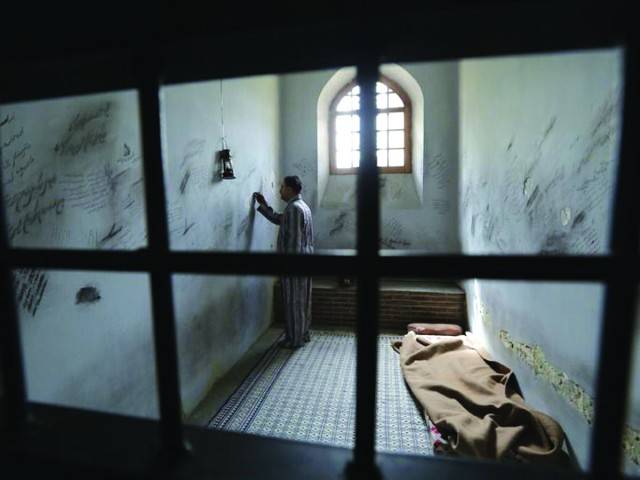
The Lahore High Court (LHC) on Wednesday asked the Government of Pakistan to clarify and outline what steps had been taken to bring back Pakistanis who have been convicted and jailed in Iran.
“The deputy attorney general should assist this court on the next date of hearing as to what steps have been taken regarding the transfer and extradition of convicted Pakistani prisoners in Iran,” said Justice Shahid Waheed while hearing Sohail Emmanuel vs Federation of Pakistan, an ongoing case since 2018 concerning the rights of Pakistani citizens imprisoned and/or facing imminent execution in Iran.
In the previous hearing, the Ministry of Foreign Affairs appeared before Justice Waheed and submitted a list of 102 Pakistanis jailed in Iran. The ministry said that 14 prisoners were repatriated in July this year under a prisoner transfer agreement signed in 2014. Iran had sought a similar list of its citizens jailed in Pakistan but the latter has yet to submit the details. Upon this, Justice Waheed questioned how much more time the government needed to bring back Pakistanis imprisoned in Iran.
During Tuesday’s hearing, Barrister Sarah Belal argued that of the list of 102 Pakistani nationals currently imprisoned in Iran, 65 have already been convicted and were thus eligible to be brought back home under the 2014 prisoner transfer agreement. She added that the agreement allowed the prisoners to serve the remainder of their sentences in their home country.
Earlier in the year, Iranian Deputy Minister for Justice and Human Rights Mahmoud Abbasi had said that they were ready to repatriate 44 Pakistani prisoners on humanitarian grounds but were awaiting a response from Pakistani authorities. However, despite more than six months having passed, Pakistan has yet to expedite their return. Iran released thousands of prisoners when the pandemic first struck and is now entering a deadly second wave with a sharp spike in cases since October 15.
Speaking at a small gathering hosted by Justice Project Pakistan last Saturday, Special Advisor to the Prime Minister Zulfikar Bukhari reiterated his commitment to bringing back all Pakistanis imprisoned abroad whether they had committed a crime or not. On November 4, 41 Pakistanis imprisoned in Sri Lanka were brought back to Pakistan under a 2004 prisoner transfer agreement.
Due to the lack of a uniform consular policy, Pakistani citizens imprisoned abroad lack consular support and adequate legal representation, often suffering due process violations such as long periods of detention without charge or trial. The majority of Pakistani prisoners in foreign jails are arrested for non-lethal crimes such as drug trafficking, theft and violation of immigration laws.
In a statement, Ali Haider Habib, spokesperson of Justice Project Pakistan, said, “Prisoner transfer agreements are crucial instruments to bring back destitute Pakistanis caught in the web of a foreign criminal justice system. We managed to successfully repatriate prisoners from Sri Lanka recently and now Iran should be next. These prisoners are fighting against the clock for their survival amid a pandemic and must be brought back home.”
‘Death row inmates suffering from schizophrenia’
A medical board constituted by the Supreme Court of Pakistan on December 15 submitted its reports on two mentally ill prisoners on death row, declaring that both inmates are suffering from schizophrenia.
A five-member bench headed by Justice Manzoor Ahmad Malik was hearing the clubbed petitions of Kanizan Bibi, Imdad Ali and Ghulam Abbas who have respectively spent 30, 18 and 14 years on death row while exhibiting acute symptoms of mental illness. In September this year, the court ordered for a fresh medical examination of Kanizan and Abbas while appointing Professor Dr. Mowadat Hussain Rana and Advocate Supreme Court Haider Rasul Mirza as amici curiae.
“Imdad was not given counsel of his choice, but rather a lawyer appointed by the state. The lawyer never met the client and was not even given time to prepare. This is all extremely unfair, and in Imdad’s case it is a matter of life and death,” said Justice Manzoor Ahmad Malik. Imdad had already been declared to be suffering from schizophrenia during an earlier medical review.
Justice Malik later asked the amici curiae to submit their recommendations at the next date of hearing set for January 4, 2020.
In March last year, another severely ill death row prisoner died in a hospital due to multiple ailments. Diagnosed with paranoid schizophrenia by jail authorities in 2008, Khizar Hayat, 56, had become severely anaemic and hypotensive. After spending 16 long years on death row, he died at Jinnah Hospital Lahore where he was admitted after he stopped taking food and medication.
Kanizan Bibi, a middle-aged woman diagnosed with paranoid schizophrenia, was sentenced to death in 1991. According to her family, she was arrested when she was just 16 years old, tortured, and then forced into confessing her involvement in murder. Due to the trauma she has endured, she hasn’t spoken a word in several years. Ghulam Abbas was arrested in 2004 and has since been prescribed powerful anti-psychotic medication requiring prompt medical attention. Imdad Ali, 52, was earlier termed a ‘treatment-resistant case’ and has spent many years in solitary confinement.
Pakistan is a signatory to international treaties and conventions prohibiting the execution of mentally ill prisoners, including the International Covenant on Civil and Political Rights (ICCPR) and Convention Against Torture (CAT).

“The deputy attorney general should assist this court on the next date of hearing as to what steps have been taken regarding the transfer and extradition of convicted Pakistani prisoners in Iran,” said Justice Shahid Waheed while hearing Sohail Emmanuel vs Federation of Pakistan, an ongoing case since 2018 concerning the rights of Pakistani citizens imprisoned and/or facing imminent execution in Iran.
In the previous hearing, the Ministry of Foreign Affairs appeared before Justice Waheed and submitted a list of 102 Pakistanis jailed in Iran. The ministry said that 14 prisoners were repatriated in July this year under a prisoner transfer agreement signed in 2014. Iran had sought a similar list of its citizens jailed in Pakistan but the latter has yet to submit the details. Upon this, Justice Waheed questioned how much more time the government needed to bring back Pakistanis imprisoned in Iran.
During Tuesday’s hearing, Barrister Sarah Belal argued that of the list of 102 Pakistani nationals currently imprisoned in Iran, 65 have already been convicted and were thus eligible to be brought back home under the 2014 prisoner transfer agreement. She added that the agreement allowed the prisoners to serve the remainder of their sentences in their home country.
Earlier in the year, Iranian Deputy Minister for Justice and Human Rights Mahmoud Abbasi had said that they were ready to repatriate 44 Pakistani prisoners on humanitarian grounds but were awaiting a response from Pakistani authorities. However, despite more than six months having passed, Pakistan has yet to expedite their return. Iran released thousands of prisoners when the pandemic first struck and is now entering a deadly second wave with a sharp spike in cases since October 15.
Speaking at a small gathering hosted by Justice Project Pakistan last Saturday, Special Advisor to the Prime Minister Zulfikar Bukhari reiterated his commitment to bringing back all Pakistanis imprisoned abroad whether they had committed a crime or not. On November 4, 41 Pakistanis imprisoned in Sri Lanka were brought back to Pakistan under a 2004 prisoner transfer agreement.
Due to the lack of a uniform consular policy, Pakistani citizens imprisoned abroad lack consular support and adequate legal representation, often suffering due process violations such as long periods of detention without charge or trial. The majority of Pakistani prisoners in foreign jails are arrested for non-lethal crimes such as drug trafficking, theft and violation of immigration laws.
Due to the lack of a uniform consular policy, Pakistani citizens imprisoned abroad lack consular support and adequate legal representation, often suffering due process violations such as long periods of detention without charge or trial
In a statement, Ali Haider Habib, spokesperson of Justice Project Pakistan, said, “Prisoner transfer agreements are crucial instruments to bring back destitute Pakistanis caught in the web of a foreign criminal justice system. We managed to successfully repatriate prisoners from Sri Lanka recently and now Iran should be next. These prisoners are fighting against the clock for their survival amid a pandemic and must be brought back home.”
‘Death row inmates suffering from schizophrenia’
A medical board constituted by the Supreme Court of Pakistan on December 15 submitted its reports on two mentally ill prisoners on death row, declaring that both inmates are suffering from schizophrenia.
A five-member bench headed by Justice Manzoor Ahmad Malik was hearing the clubbed petitions of Kanizan Bibi, Imdad Ali and Ghulam Abbas who have respectively spent 30, 18 and 14 years on death row while exhibiting acute symptoms of mental illness. In September this year, the court ordered for a fresh medical examination of Kanizan and Abbas while appointing Professor Dr. Mowadat Hussain Rana and Advocate Supreme Court Haider Rasul Mirza as amici curiae.
“Imdad was not given counsel of his choice, but rather a lawyer appointed by the state. The lawyer never met the client and was not even given time to prepare. This is all extremely unfair, and in Imdad’s case it is a matter of life and death,” said Justice Manzoor Ahmad Malik. Imdad had already been declared to be suffering from schizophrenia during an earlier medical review.
Justice Malik later asked the amici curiae to submit their recommendations at the next date of hearing set for January 4, 2020.
In March last year, another severely ill death row prisoner died in a hospital due to multiple ailments. Diagnosed with paranoid schizophrenia by jail authorities in 2008, Khizar Hayat, 56, had become severely anaemic and hypotensive. After spending 16 long years on death row, he died at Jinnah Hospital Lahore where he was admitted after he stopped taking food and medication.
Kanizan Bibi, a middle-aged woman diagnosed with paranoid schizophrenia, was sentenced to death in 1991. According to her family, she was arrested when she was just 16 years old, tortured, and then forced into confessing her involvement in murder. Due to the trauma she has endured, she hasn’t spoken a word in several years. Ghulam Abbas was arrested in 2004 and has since been prescribed powerful anti-psychotic medication requiring prompt medical attention. Imdad Ali, 52, was earlier termed a ‘treatment-resistant case’ and has spent many years in solitary confinement.
Pakistan is a signatory to international treaties and conventions prohibiting the execution of mentally ill prisoners, including the International Covenant on Civil and Political Rights (ICCPR) and Convention Against Torture (CAT).


